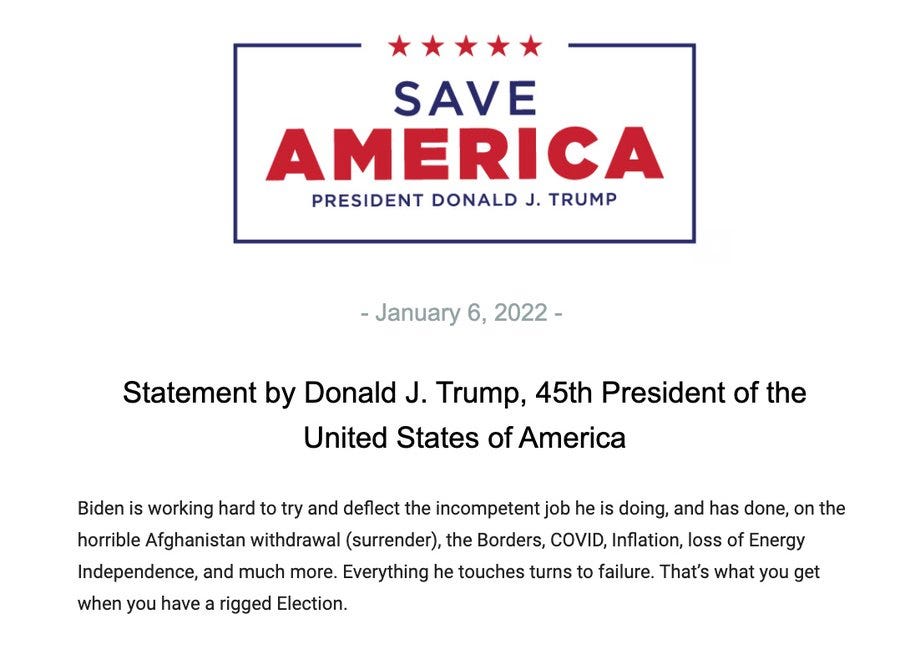Before we start, if you want to read more about Project 2025 and Intelligence, please check out Tiffany Torres Williams’ discussion of how the GOP plans to defund and radically reject justice.
This section is written but Dustin J. Carmack, former Chief of Staff to Director of Intelligence John Ratcliffe during the first Trump Administration, Policy Director for Ron DeSantis' 2024 presidential campaign, cybersecurity and intelligence for the Heritage Foundation, and currently serves as Director of Public Policy at Meta Platforms Inc. It was under his time at the Office of the Director of National Intelligence (ODNI) that the office declassified Russian disinformation about Hillary Clinton and the 2016 presidential campaign, "despite widespread objections from across the intelligence community.”
Carmack opens by discussing the mission statement for the Intelligence Community (IC) and quoting Abraham Lincoln: "The occasion is piled high with difficulty, and we must rise with the occasion…. [W]e must think anew, and act anew," which he uses as reasoning to correct "past mistakes," including "groupthink" and "personal incentives," setting the stage for a discussion of the removal of political opposition within the departments and how to set up a partisan government for the incoming conservative President.
"The American people are understandably frustrated by the fact that those who abuse power are rarely held to account for their actions. This must change, beginning with leadership that is both committed to ensuring that these agencies faithfully execute the laws of the land under the Constitution and resolved to punish and remove any officials who have abused the public trust."
Oh, the irony.
OFFICE OF THE DIRECTOR OF NATIONAL INTELLIGENCE (ODNI)
The ODNI was established in the aftermath of 9/11 under the orders of George W. Bush as a means to provide oversight of all Intelligence departments in order to "break institutional silos that had caused past intelligence...failures." However Carmack sees it as a "bureaucratic 5th wheel" that cites "vague" authority in departments such as the Central Intelligence Agency (CIA) and Department of Defense (DOD). He feels ODNI can best serve an incoming conservative President, including managing human resources, and slashing redundant positions and costs. He cites "interagency rivalries" and "festering issues" as continuing problems, along with "abuse of mandated onboarding," "recruitment and retention failures," and a "lack of will to remove underperforming or timely adjudicate the misconduct of senior managers and other employees."
This is clearly building up in defense of what is now playing out in multiple Intelligence departments.
Last, but not least, Intelligence, he says, must address "woke" culture, including [in quotes] "social justice" issues and advocacy that he says are replacing patriotism, colorblindness, and competence.
This comes on the heels of a department memo from the Defense Intelligence Agency, pausing the observances of Martin Luther King Jr. Day, Juneteenth, Pride, Holocaust Remembrance Day, and many other events meant to celebrate diversity. Colorblind, indeed...
The Intelligence Reform and Terrorism Prevention Act of 2004 (IRTPA) was passed as a means to detect and counter national security threats. Executive Order 12333, "U.S. Intelligence Activities" (originally signed by Ronald Reagan in 1981), was last amended by George W. Bush in 2008 to address threats to the U.S. and the "proliferation of weapons of mass destruction." However, Carmack feels it's time for another amendment to include cyber threats, to give the DNI a greater role as leader of the IC (including "mov(ing) around money and personnel" and "restructur(ing) areas through executive orders...as needed"), to speed up security clearances, and, above all, create political alignment between the President and DNI ("a mission that can be accomplished only with the conductor and his orchestra playing in sync").
CENTRAL INTELLIGENCE AGENCY (CIA)
The CIA serves as a foreign intelligence collection service that provides all-source intelligence analysis and reporting, and conducts covert action when required to do so by the President. Employees are public servants and deemed "apolitical," meant only to uphold the Constitution and laws of the United States.
"The President requires a CIA that provides unbiased and apolitical foreign intelligence information and, when necessary, can act capably and effectively on any covert action findings."
On February 4th the Central Intelligence agency offered buyouts to its entire workforce, "citing an aim to bring the agency in line with U.S. President Donald Trump's priorities."
Carmack goes on to say that the President will choose a Director and Deputy who can "immediately begin to implement the President's agenda," and halt all current hiring. Any further hiring of directorates must align closely with the President's priorities. In order to "rein in the bureaucracy" the Director should broaden recruitment, expedite onboarding, shift resources away from headquarters, include buyouts, hire more private-sector experts to senior positions, and in order to "break the cabal of bureaucrats in D.C.," move directorates such as Support and Science and Technology further from Washington D.C. to possible virtual positions. All offices and employees focusing on promoting "divisive ideological or cultural agendas," writes Carmack, will immediately see a shift in resources, diverting them away from "any activities that promote unnecessary and distracting social engineering."
COVERT ACTION
Defined as "activities of the United States Government to influence political, economic, or military conditions abroad, where it is intended that the role of the United States Government will not be apparent or acknowledged publicly," this feels like a very pertinent issue, though I’m not sure any action by the Donald Trump could ever be deemed "covert."
ODNI AND CIA ORGANIZATIONAL RECOMMENDATIONS
This includes more conversation about buyouts for "areas of bloat" and "underperforming cadre," as well as exploring concepts like "Up and Out" beginning with the senior officers. This, Carmack says, would "encourage new ideas and perspectives." He complains that security clearances take too long under the current CIA director, and wants to reduce the process by 70%.
PREVENTING THE ABUSE OF INTELLIGENCE FOR PARTISAN PURPOSES
"The politization of intelligence risks [contribute] to policy failures or even [undermine] our democratic systems here at home."
I found this section a little mind-blowing if I'm honest, if not completely tone-deaf. I don't think anyone involved has any intent of an unbiased, a-political Intelligence Community.
Carmack discusses "political neutrality" in order to "rectify the damage done...regarding the claims of Trump-Russia collusion following the 2016 election and the suppression of the Hunter Biden laptop investigation."
In 2020 the Senate Intelligence Committee submitted a 1000-page report, concluding that Russia did, indeed, interfere in the 2016 election. Hunter's laptop, however, contained no smoking gun.
Carmack claims that dismissing the laptop scandal hurt the CIA's credibility and showed the politicization among IC officials. He wants untrustworthy officials removed, and security clearances revoked for anyone discussing their work in the press. And while insisting on "political neutrality," he also says all military and civilian IC trainings will include a mandatory course on "repercussions for abuse in the execution of duties." The definition of "abuse" remains foggy, as well as who might define it. And above all, "Political leaders should avoid 'manipulation-by-appointment,' a practice by which intelligence leaders are selected for their policy views or political loyalties instead of their skilled expertise."
Hmm.
FOREIGN INTELLIGENCE SURVEILLANCE ACT (FISA)
This section discusses how the IC might target foreign terrorists, spies, and cyber hackers. Carmack claims that in the past the FBI and DOJ have hidden "vital information" and made errors when submitting applications. Therefore the incoming President must protect against this with stiffer penalties, tighter controls, prohibition of politically-motivated intelligence, and reforms.
While this section is titled for "foreign intelligence," it clearly reflects the consequences of missteps closer to home.
CHINA-FOCUSED CHANGES, REFORMS, AND RESOURCES
Carmack presents China as enemy #1 and states that the U.S. must do more to learn about and keep up with China's technological advancements, especially as they pertain to their military.
NATIONAL COUNTERINTELLIGENCE AND SECURITY CENTER (NCSC)
More discussion of how to counter China (and Russia, though it is discussed only minimally), and how corporate America needs to be a willing partner, not bending to the "left-wing activists" who still buy and sell Chinese products.
ADDITIONAL AREAS FOR REFORM
Carmack states Intelligence has failed since the Johnson Administration (1963-1969) and cites the Cold War as a "more balanced...focus with greater emphasis on strategic intelligence," claiming that hyperpartisanship in the IC threatens to undermine our Republic. Carmack's prime example is in the analysis of the 2020 election, where he claims CIA officials downplayed evidence of influence from China, subtly inserting the notion of a stolen election, one of Donald Trump's most vocal and unsubstantiated arguments. Carmack also discusses the origin of the COVID-19 virus, and subsequent evidence.
"Seeing something and understanding what you are seeing are two different things, so a President should consistently and patiently press the IC about its potential biases, assumptions, methodology, and sourcing." - Dustin Carmack
Carmack wants to declassify intelligence because "services are overwhelmingly owned, managed, and defended by the private sector," however this would lead to obvious problems, including too many cooks and the potential for a very large game of "Telephone" with critical evidence. He goes on to discuss the need for a real-time audit that electronically flags "unauthorized access" to critical information, which seems to contradict his previous statement, or at least shows a bias in private vs. government agencies. In the meantime, he says, overclassification is a bad idea, and should be downgraded, as "borne out" in Russia's invasion of Ukraine, before which U.S. Intelligence did have some warning. Though I'm not sure this is a great example of success.
The next section stood out considering this week's question of access to private information within departments like USAID and the U.S. Treasury.
Carmack wants to upgrade technology within Intelligence, making it "easier to organize and locate, and facilitating more rapid review and release capabilities for records of emerging interest." He rattles off a long list of different capabilities he'd like to see within the entire organizational tech/AI system used by Intelligence and most departments, most of which concerns compiling all inter-agency information in one place, expansion of Cloud-like technology, and easy and rapid accessibility.
This is likely something to revisit once we've figured out why Elon and his pubescent cohorts are locked inside the Treasury with the payment system.
"This would include additional work with private-sector expertise, granting clearances to niche sector experts and United States citizen commercial and financial partners as needed." - Dustin Carmack
Carmack discusses the difficulty in protecting identities of Intelligence officers, especially in the age of smartphones and social media, stating that the incoming Administration needs to "double down on...training so that members of the IC will have the expertise they need to operate clandestinely..." Interesting, considering just this week the CIA sent out an unclassified email that included the names of everyone hired within the last two years, sending shockwaves through the entire community, and a very clear message.
"Exposing the identities of officials who do extremely sensitive work would put a direct target on their backs for China. A disastrous national security development." - Senator Mark Warner, D-VA
Carmack goes on to talk about intelligence conflicts and negotiations with various European countries, questions of trade wars with Russia and China, and the ultimate decision of whether or not to push back against the EU. He also mentions the President's Daily Brief (PDB) with Intelligence, though currently I wonder if these are less about conflicts outside the U.S. and more about the dissolving of our own Intelligence system within the government itself. In the meantime, these meetings will remain fairly intimate, as pink slips continue to go out.
Carmack discusses the roles within the Intelligence department, debating whether they should be political appointees or career civilians, and though they must secure unbiased execution of said roles, must always "reflect the Administration's agenda." The President's Intelligence Advisory Board is given access to all of the information needed to perform its function, as well as direct access to the President. These members are tasked with giving "independent, informed advice and opinion concerning major matters of national security."
Donald Trump tapped Devon Nunes, CEO of Truth Social and leader of Trump Media & Technology Group, of which Trump holds 115 million shares worth $4.2 billion, to lead the Intelligence Advisory Board.
Carmack concludes by discussing the new Administration's push to refocus its efforts on "space-related intelligence collection," discussing threats (and likely speed and competition) coming from China and Russia, and with whom the U.S. might collaborate.
Project 2025
Ellie is an author, editor, and owner of Red Pencil Transcripts, and works with filmmakers, podcasts, and journalists all over the world. She lives with her family just outside of New York City, and is represented by Vicki Marsdon at High Spot Literary.












